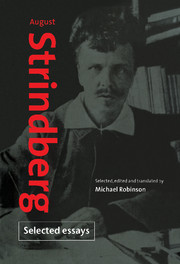Book contents
- Frontmatter
- Contents
- Notes on the text
- Introduction
- from Vivisections (1887)
- ‘On Modern Drama and Modern Theatre’ (1889)
- from Vivisections II (1894)
- ‘Césarine’ (1894)
- ‘Deranged Sensations’ (1894)
- ‘In the Cemetery’ (1896)
- from Jardin des Plantes (1896)
- ‘On the Action of Light in Photography’ (1896)
- ‘A Glance into Space’ (1896)
- ‘Edvard Munch's Exhibition’ (1896)
- ‘The Synthesis of Gold’ (1896)
- ‘Contemporary Gold-Making’ (1896)
- ‘The Sunflower’ (1896)
- ‘The Mysticism of World History’ (1903)
- ‘August Strindberg on Himself’ (1909)
- Notes and commentary
- Index
‘On Modern Drama and Modern Theatre’ (1889)
Published online by Cambridge University Press: 18 December 2009
- Frontmatter
- Contents
- Notes on the text
- Introduction
- from Vivisections (1887)
- ‘On Modern Drama and Modern Theatre’ (1889)
- from Vivisections II (1894)
- ‘Césarine’ (1894)
- ‘Deranged Sensations’ (1894)
- ‘In the Cemetery’ (1896)
- from Jardin des Plantes (1896)
- ‘On the Action of Light in Photography’ (1896)
- ‘A Glance into Space’ (1896)
- ‘Edvard Munch's Exhibition’ (1896)
- ‘The Synthesis of Gold’ (1896)
- ‘Contemporary Gold-Making’ (1896)
- ‘The Sunflower’ (1896)
- ‘The Mysticism of World History’ (1903)
- ‘August Strindberg on Himself’ (1909)
- Notes and commentary
- Index
Summary
The theatre is certainly not the most momentous or world-shattering of subjects, but it is an inexhaustible one, and always capable of engaging attention and sustaining interest.
In the great civilised nations, with their philosophers and merchants, there has been no national drama for a generation, and yet people have managed to survive, and even produced the greatest thinkers, statesmen and inventors of the age, which makes a nonsense of the traditional belief that the drama is the highest expression of a nation's civilisation.
Current crises in the theatre have led people to conclude, on the one hand, that the theatre is a dying art form, and on the other, that this art form has merely fallen behind, and needs to be modernised in accordance with the demands of the age so that it may once again assume its fairly unpretentious place as an instrument of education. It cannot be denied that there is something archaic about the theatre in its present form, as huge as a circus opening out on to a stage with a Graeco-Roman triumphal arch, decorated with emblems and grotesque masks, reminiscent of the centuries before Christ. The red drapes, the brilliant curtain, the place of the orchestra retained since antiquity, the trap which leads down to Charon, the elaborate machinery by which gods descend to close the final act all take the memory back to prehistoric times when the theatre was the site of religious and national festivals. The masses still go along to the theatre expecting to see an episode from world history, or at least scenes from the annals of their own country,
- Type
- Chapter
- Information
- August Strindberg: Selected Essays , pp. 73 - 86Publisher: Cambridge University PressPrint publication year: 1996
- 1
- Cited by



